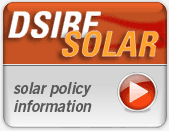Capital Sun Group understands that purchasing a solar system or other green technology can require a significant amount of money. So we are here to help you make the right decisions financially for the right system. You should think of the products we offer as investments. Investments in your future and the future of our planet.
When researching an investment in renewable energy there are several long and short term financial factors that should be considered:
- Government Tax Incentives
- Federal Tax Credit (30%)
- State Tax Incentives
- County Tax Incentives
- Bonus MACRS Depreciation
- Energy Savings
- Property Value
- Solar Renewable Energy Credits
Government Tax Incentives
The Federal Government increased the Renewable Energy Tax Credit to 30% in 2009 with the signing of The American Recovery and Reinvestment Act of 2009. This is a 30% tax credit on the entire cost of the Solar Hot Water, Photovoltaics, Wind, Fuel Cells, Geothermal Heat Pumps, Other Solar Electric Technologies, or Fuel Cells using Renewable Fuels system.
State Governments also offer renewable energy tax incentives to lower the cost of solar systems. Maryland now offers $1,000 per PV installation residential systems and $500 per kW for commercially installed systems. For Solar Hot Water Systems Maryland has a $500 residential tax credit and a 15% commercial tax credit.
Some counties also offer different types of renewable energy tax incentives. Most counties in Maryland use property tax incentives. Prince Georges County offers property tax credit worth 50% of the entire installed cost for Solar Water Heat, Solar Space Heat, Photovoltaics, and Geothermal Heat Pumps. Montgomery County offers a commercial High Performance Building Property Tax Credit worth 10% to 75% from property taxes owed on building for 3-5 years; varies by building type and building rating. For additional up-to-date incentive details please visit the link below or contact us.
In addition to the 30% federal income tax credit, the federal government provides a very attractive depreciation-based incentive to businesses that install solar systems. This incentive has been modified from year to year, and has most recently been updated in December of 2010 as part of The Tax Relief, Unemployment Insurance Reauthorization, and Job Creation Act of 2010. Bonus depreciation is the percentage of depreciation you can take in the first year the solar system is in service. Since bonus depreciation is 50% in 2012, that means that you can depreciate a solar system in half the first year it is in service.
Energy Savings
Solar systems reduce or eliminate the amount of energy consumed. The average 1 kilowatt system generates 1,250 kilowatt hours a year. We have seen electric rates as high as $.21, this would mean an annual savings of $262.50. Solar systems are designed to last at least 30 years. Which means without any rise in electric rates a 1 kW system would save an average of $7,875. The savings will likely be more not only because the systems should last longer but because the electric rates are projected to keep rising. Just in the last few years rates have risen up to 60% in some areas. In Maryland, Virginia, and the District of Columbia rate increases have already been approved.
Property Value
Besides providing savings on your monthly utility bill, a solar electric system raises the property value of your home. The US Department of Energy (through the Lawrence Berkeley National Laboratory) released a report that found California homes with PV systems in place on average sold for $17,000 more than their non-PV installed counterparts. Which came out to $3.90 to $6.40 per watt increase in home value. Other reports have found that for every dollar saved on utility bills the home value increased by $20.
Solar Renewable Energy Credits
Capital Sun Group is Platinum Partner with Sol Systems Company. This partnership enables homeowners, businesses, installers and developers to fully realize the value of their solar energy systems by registering their systems to produce solar renewable energy credits (SRECs) and then selling these SRECs. The term SREC stands for Solar Renewable Energy Credit and is a tradable credit that represents all the clean energy benefits of electricity generated from a solar electric system. Each time a solar electric system generates 1000kWh (1MWh) of electricity, an SREC is issued which can then be sold or traded separately from the power.
SRECs are purchased by electrical utilities or energy suppliers who need to meet a Renewable Portfolio Standard (RPS). The value of SRECs are quantified by three major factors:
- State RPS requirements
- Value of the state’s Solar Alternative Compliance Payment (ACP)
- Supply and demand of SRECs in that specific state
Because of these factors, SREC values can vary dramatically from state to state. SRECs are available for Solar Hot Water Systems only in certain states, Maryland and the District of Columbia are on that list.


